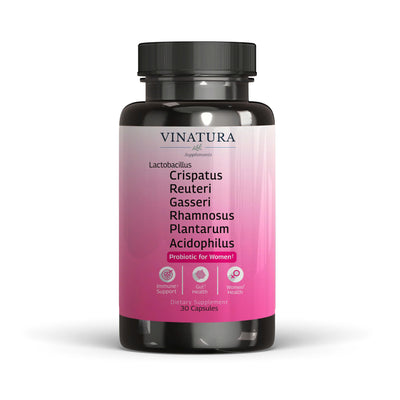
7 Foods With Lactobacillus Acidophilus?
Lactobacillus Acidophilus is a beneficial bacteria known for its positive effects on gut health. It's naturally found in a variety of fermented foods. In this article, we will uncover seven foods with Lactobacillus Acidophilus, from natural yogurt and kefir to sauerkraut, tempeh, kimchi, cheese, and miso. We will delve into which offers this essential probiotic's highest concentration.
Before exploring further, please read the disclaimer located at the end of this webpage.
Lactobacillus Acidophilus And Its Benefits
Lactobacillus Acidophilus, a probiotic, is renowned for its many health benefits.
One of the primary benefits is the promotion of beneficial bacteria in the gut, which significantly enhances digestive health.
Additionally, it plays a crucial role in vitamin synthesis. Lactobacillus Reuteri is not only good for digestion but also has benefits for hair growth.
Those lactose intolerant often find their symptoms significantly improved due to the consumption of Lactobacillus Acidophilus.
This probiotic also boosts nutrient absorption, ensuring that your body derives the maximum advantage from the food you consume.
Women, in particular, are drawn to Lactobacillus Acidophilus for its skin-protective and anti-aging properties. Such striking benefits make it a vital component in many foods.

7 Foods With Lactobacillus Acidophilus
Natural Yogurt
Natural Yogurt is one of the most common sources of Lactobacillus Acidophilus. Not only is it a versatile and delicious food, but it also contains an ample amount of this beneficial probiotic.
Research suggests a good yogurt product should contain at least 100g/gal of Lactobacillus Acidophilus to maintain its beneficial structure and properties [1].
Various types of yogurt, such as stir curd, set curd, and drinkable yogurt, are available in the market. However, regardless of the sort, it is essential to keep yogurt refrigerated, as the concentration of Lactobacillus Acidophilus tends to decrease over time.
Therefore, to reap the full benefits of this probiotic, consuming yogurt as well as foods with Lactobacillus Acidophilus regularly and checking the product's freshness is recommended.

Kefir
Kefir is a fermented milk product rich in Lactobacillus Acidophilus, made by combining kefir grains with fresh milk or water. These grains are a symbiotic mixture of yeast and live bacteria, and their fermentation process adds a significant amount of Lactobacillus Acidophilus to the final product [4].

Sauerkraut
Sauerkraut, a fermented food, is a rich source of Lactobacillus Acidophilus. Lactic acid bacteria facilitate this vegetable fermentation. A surge in Lactobacillus Acidophilus can be noticed between 3 and 7 days into the fermentation process [3].
Apart from its probiotic benefits, sauerkraut is a nutritional powerhouse, offering fiber, iron, and vitamins C and K. Through the process of fermentation, the nutrients in sauerkraut are heightened in their bioavailability, rendering it a versatile and nutritious inclusion to one's dietary choices.

Tempeh
Tempeh is one of the popular foods with Lactobacillus Acidophilus, and is crafted by fermenting soybeans with Rhizopus mold. This unique process creates an environment conducive to the growth of Lactobacillus Acidophilus, a beneficial bacteria.
Additionally, tempeh can be prepared using grains such as barley, which also harbors this advantageous microorganism.
Not only is tempeh a probiotic-rich delicacy, but it also serves as an excellent source of dietary fiber and vitamin B12, both of which contribute to overall well-being.

Kimchi
Kimchi, a staple in Korean cuisine, is created through the fermentation of vegetables such as cabbage and radishes. These vegetables are then seasoned with a delightful blend of garlic, ginger, chili peppers, and various spices.
During fermentation, kimchi develops Lactobacillus Acidophilus, an abundant and beneficial form of bacteria. As a result, kimchi becomes a valuable source of this advantageous probiotic.
Moreover, kimchi is renowned for its exceptional health benefits, as it is an excellent source of iron and essential vitamins.

Cheese
A wide variety of cheeses can be found across the globe, and it's worth noting that not all of them include Lactobacillus Acidophilus. Extensive research on traditional white cheese and probiotic cheese reveals that Lactobacillus Acidophilus can be found in both types [2].
The presence of this probiotic in cheese is due to the fermentation process, which involves lactic acid bacteria. Probiotic cheeses, in particular, have a much higher concentration of these beneficial bacteria than traditional cheeses [2].
However, consuming foods high in lactobacillus acidophilus such as probiotic cheeses in moderation is recommended due to their high-fat content.
Miso Paste
Miso paste is also one of the foods high in acidophilus. This soybean paste results from the fermentation of soybeans and rice with salt over an extended period.
During fermentation, lactic acid bacteria, including strains of Lactobacillus Acidophilus, develop, contributing to its probiotic value.

What Is The Best Food With Lactobacillus Acidophilus?
Deciding on the "best" food for Lactobacillus Acidophilus depends mainly on individual preferences, dietary choices, and tolerances. Each food item listed boasts its unique nutritional profile and offers a considerable dose of this beneficial probiotic.
It's important to remember that a well-rounded diet, including various foods, can provide a balanced intake of Lactobacillus Acidophilus, rather than focusing on a single source.
Supplements with Lactobacillus Acidophilus
Supplements serve as an excellent option for those seeking higher dosages or more precision in their Lactobacillus Acidophilus intake.
These are available in various forms, such as powders or capsules. While there's no universally optimal method for supplementing Lactobacillus Acidophilus identified in scientific studies, a daily dosage of 3 billion CFU is often recommended.
This can be taken with or without food, per individual convenience and preference. It is, however, crucial to select supplements from reputable manufacturers to ensure purity, potency, and safety.

Conclusion
Foods with Lactobacillus Acidophilus, like natural yogurt, kefir, sauerkraut, tempeh, kimchi, certain cheeses, and miso, offer a plethora of health benefits. Regularly incorporating these into your diet can work wonders for your gut health, digestion, and immune system. Besides, for those seeking a more concentrated option, lactobacillus acidophilus supplements can serve as a potent alternative that you can consume daily.
References
- [1] Ganesh, S. (2006). A novel yogurt product with Lactobacillus acidophilus A novel yogurt product with Lactobacillus acidophilus.
- [2] Kasımoğlu, A., Göncüoğlu, M., & Akgün, S. (2004). Probiotic white cheese with Lactobacillus acidophilus. International Dairy Journal, 14(12), 1067–1073. https://doi.org/10.1016/j.idairyj.2004.04.006
- [3] Lu, Z., Breidt, F., Plengvidhya, V., & Fleming, H. P. (2003). Bacteriophage Ecology in Commercial Sauerkraut Fermentations. Applied and Environmental Microbiology, 69(6), 3192–3202. https://doi.org/10.1128/aem.69.6.3192-3202.2003
- [4] Sharifi, M., Moridnia, A., Mortazavi, D., Salehi, M., Bagheri, M., & Sheikhi, A. (2017). Kefir: a powerful probiotics with anticancer properties. Medical Oncology, 34(11). https://doi.org/10.1007/s12032-017-1044-9
Author

Product Disclaimer
Including an ingredient or study does not evaluate, endorse, or recommend any Vinatura product or any third-party product. Some ingredients discussed may not be used in any Vinatura product.
The content of the articles has not been evaluated by the Food and Drug Administration (FDA) and is not intended to promote or endorse any specific product. Any products sold on this website are not intended to diagnose, treat, cure, or prevent any disease.
Opinions and Endorsements
Any claims, statements, or opinions expressed in the articles are those of the author(s) and do not necessarily reflect the views or opinions of the manufacturers of the dietary supplement products. The products sold on this website are separate from the content of the articles and are not directly endorsed or associated with the information presented here.
Liability Disclaimer
The author(s) of the articles, website, and manufacturers of the dietary supplement products do not assume any liability for any potential consequences arising from the use of the information provided in the articles. Ingredient effects, dosages, and safety vary by individual, formulation, and context; some ingredients interact with medications or may be unsuitable during pregnancy or lactation. It is recommended that individuals consult with a qualified healthcare professional before making any dietary or lifestyle changes, including the use of dietary supplements.
Product Usage
Please refer to the product labels and packaging for specific usage instructions and guidelines for the dietary supplement products sold on this website.
Customer Support
For any concerns or questions regarding the dietary supplement products, please contact our customer support team, who will be more than happy to assist you.





Leave a Comment
Be the first to comment.
What do you think?